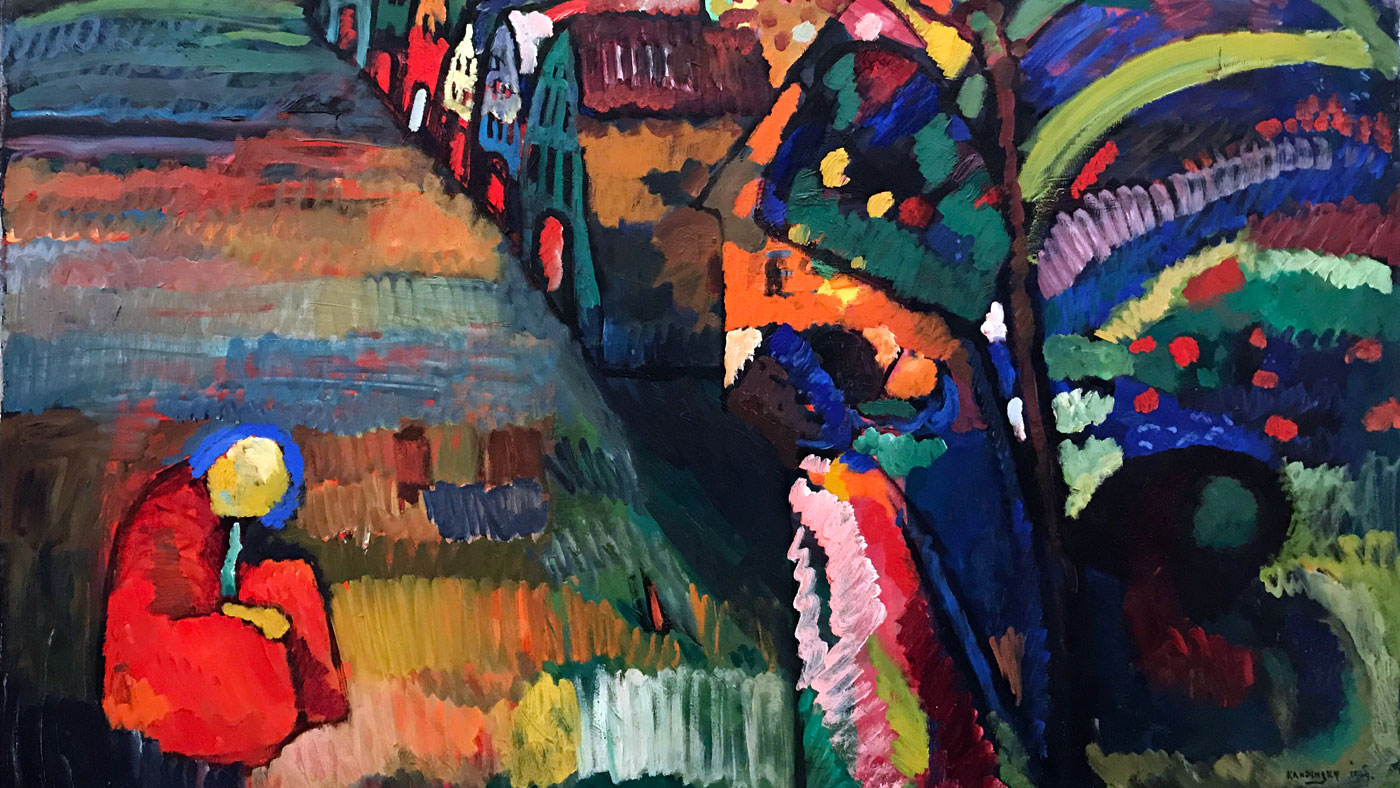Jewish family fighting to reclaim £18m painting accuse officials of bias
Kandinsky masterpiece last changed hands soon after the Nazi invasion of the Netherlands

A free daily email with the biggest news stories of the day – and the best features from TheWeek.com
You are now subscribed
Your newsletter sign-up was successful
A Jewish family suing a Dutch museum for the return of an £18m painting bought from the Nazis in 1940 have accused officials of showing bias.
The family’s lawyers “told an Amsterdam court there was an ‘appearance of partiality and a conflict of interest’ within the Netherlands’ restitutions committee which advises on the return of art lost by Jewish families”, The Guardian reports.
The committee ruled two years ago that Amsterdam’s Stedelijk Museum could keep Bild mit Hausern (Painting with Houses), by Russian abstract artist Wassily Kandinsky. The institution bought the artwork from Robert Lewenstein at a knock-down price five months into the Nazi occupation of the Netherlands, when he and his wife had already fled to France.
The Week
Escape your echo chamber. Get the facts behind the news, plus analysis from multiple perspectives.

Sign up for The Week's Free Newsletters
From our morning news briefing to a weekly Good News Newsletter, get the best of The Week delivered directly to your inbox.
From our morning news briefing to a weekly Good News Newsletter, get the best of The Week delivered directly to your inbox.
Nevertheless, the committee said that Lewenstein had freely chosen to sell the painting and the museum had bought it in good faith.
“To label the auction of works of art belonging to the Lewenstein family as voluntary is bizarre,” lawyer Simon van der Sluijs, representing Lewenstein’s heirs, told a court in the Netherlands capital. “Immediately after the invasion, the Germans started looting art. Pressure and coercion and the justified fear that lived among the Jews were used.”
According to the family, four of the seven members of the restitutions committee are either members of the Stedelijk Museum’s business club or work at an office that sponsors the institution.
A spokesperson for the museum denied any conflict of interest, insisting that all of the committee members were “competent and able to assess the case”. None had a financial interest in the museum or had ever been employed by it, the representative said.
A free daily email with the biggest news stories of the day – and the best features from TheWeek.com
In March, another family “complained to the Dutch culture minister that the committee in charge is not showing respect to families ‘traumatised’ by the Holocaust”, as The Telegraph reported at the time.
Descendants of Johanna Margarete Stern-Lippmann, who was killed in Auschwitz, are trying to reclaim another Kandinsky painting, also now owned by the Stedelijk Museum.
A ruling is expected in the Lewenstein case on 16 December.
Holden Frith is The Week’s digital director. He also makes regular appearances on “The Week Unwrapped”, speaking about subjects as diverse as vaccine development and bionic bomb-sniffing locusts. He joined The Week in 2013, spending five years editing the magazine’s website. Before that, he was deputy digital editor at The Sunday Times. He has also been TheTimes.co.uk’s technology editor and the launch editor of Wired magazine’s UK website. Holden has worked in journalism for nearly two decades, having started his professional career while completing an English literature degree at Cambridge University. He followed that with a master’s degree in journalism from Northwestern University in Chicago. A keen photographer, he also writes travel features whenever he gets the chance.
-
 Why are election experts taking Trump’s midterm threats seriously?
Why are election experts taking Trump’s midterm threats seriously?IN THE SPOTLIGHT As the president muses about polling place deployments and a centralized electoral system aimed at one-party control, lawmakers are taking this administration at its word
-
 ‘Restaurateurs have become millionaires’
‘Restaurateurs have become millionaires’Instant Opinion Opinion, comment and editorials of the day
-
 Earth is rapidly approaching a ‘hothouse’ trajectory of warming
Earth is rapidly approaching a ‘hothouse’ trajectory of warmingThe explainer It may become impossible to fix
-
 Epstein files topple law CEO, roil UK government
Epstein files topple law CEO, roil UK governmentSpeed Read Peter Mandelson, Britain’s former ambassador to the US, is caught up in the scandal
-
 Iran and US prepare to meet after skirmishes
Iran and US prepare to meet after skirmishesSpeed Read The incident comes amid heightened tensions in the Middle East
-
 Israel retrieves final hostage’s body from Gaza
Israel retrieves final hostage’s body from GazaSpeed Read The 24-year-old police officer was killed during the initial Hamas attack
-
 China’s Xi targets top general in growing purge
China’s Xi targets top general in growing purgeSpeed Read Zhang Youxia is being investigated over ‘grave violations’ of the law
-
 Panama and Canada are negotiating over a crucial copper mine
Panama and Canada are negotiating over a crucial copper mineIn the Spotlight Panama is set to make a final decision on the mine this summer
-
 Why Greenland’s natural resources are nearly impossible to mine
Why Greenland’s natural resources are nearly impossible to mineThe Explainer The country’s natural landscape makes the task extremely difficult
-
 Iran cuts internet as protests escalate
Iran cuts internet as protests escalateSpeed Reada Government buildings across the country have been set on fire
-
 US nabs ‘shadow’ tanker claimed by Russia
US nabs ‘shadow’ tanker claimed by RussiaSpeed Read The ship was one of two vessels seized by the US military